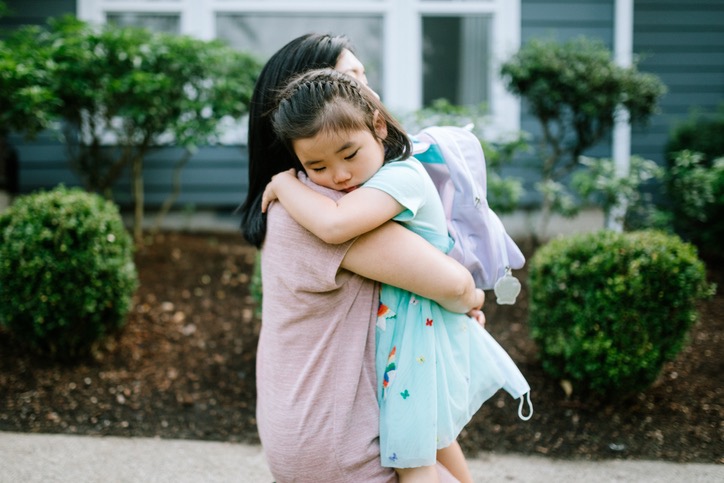Is My Preschooler Telling the Truth About Teacher Bullying?

How do you react when your child says their teacher is bullying them at preschool? We've got the answers in the form of a step-by-step guide.
Never would you think that the bullying behavior your child could possibly encounter in preschool would come from the one person you trust to care for, supervise, and educate them — i.e., their school teacher. But if your two, three, or four-year-old insists it’s the early childhood educator who is engaging in aggressive behavior, what do you do?
A four-year-old may have heard the term ‘bullying’ on TV, from an older sibling, or even from you. It’s possible that their interpretation is off the mark or they are misusing the word. It is also possible your child misheard an adult talking about the teacher, or another child accused the teacher of being a bully. According to a literature review published in the journal Cognitive Psychology, research from several studies found that toddlers tend to believe or trust testimony (stories) from others — even when these stories conflict with what the child has actually seen in real life. All of this can make it harder to figure out how seriously you should take your child’s accusation.
If you’re not sure if your preschooler is telling the truth about teacher bullying, or what to do about this potentially serious issue at your child’s school, read on for more information, tips, and advice about how to tackle this tricky and sensitive situation in four simple steps.
Step One: React and Respond

Your first instinct may be to run to your child’s school and confront the school staff. But, once you remember the impossibly tall tales your child imaginatively comes up with on a daily basis, you might start to have second thoughts about doing this.
First, sit your child down and really listen to what they have to say. Ignore your assumptions about your child’s overpoweringly creative imagination, the teacher's role, and the quality of the school — for now. Encourage your child to elaborate on the bullying situation. A younger preschooler may not have the words to explain the bullying incidents. Your child may use one or two-word sentences such as, “teacher’s mean” or, “bad teacher” to get their feelings across.
As your child talks about the bullying situation:
- Help your child to understand what bullying is and isn’t. According to the U.S. Department of Health and Human Services, “bullying is unwanted, aggressive behavior.” This repeated behavior creates “a real or perceived power imbalance.” A very young child may misinterpret a teacher’s redirection or instructions as being ‘mean’ or bullying — especially if the teacher is telling your child to do something they don’t want to do, such as share a toy or take a nap.
- Listen with care. Let your child know that you are there for them and care about everything they have to say. This can help your child to feel more comfortable as they explain the bullying incidents.
- Use words your child understands. Avoid overly wordy phrases or adult-like lingo. Asking a three-year-old if they feel that the situation has created “an imbalance of power” may only confuse them.
- Explore alternative methods of expression. If your child doesn’t have the words yet to fully explain the situation, encourage them to draw or paint what they remember. They can also tear pictures from magazines and create a piece of artwork that represents what happened regarding any school bullying incidents.
- Role-play and act out the incident. Let your child play the role of their teacher and you can play the preschool student. This might help them to re-create the teacher’s behavior if they don’t yet have the vocabulary to explain.
Even though you will need to help your child through this discussion, never put words in their mouth. Your child trusts you and takes what you have to say as fact. Language that leads your child into a narrative that you may have created won’t help you to get to the bottom of the bullying.
Once you’ve had this talk, the next step is to look for signs.
Step Two: Look For Signs
If this experience is completely new to you, learn about the signs of bullying. Sometimes what your child says isn’t as important as the non-verbal messages they might be displaying, especially if your child is too young to communicate the bullying behavior with their words. Signs of bullying may look different at different ages. In a toddler, you may notice
- Bruises or marks. Does your child have unexplained bruises or marks on their body? While these can sometimes be signs of physical abuse, toddlers and preschoolers are often prone to falls, bumps, and bangs. This can make it challenging to know whether teacher abuse or your child’s less-than-graceful developing gross motor skills are at fault. Generally, bruising around places such as the eyes should be taken seriously as it can sometimes be a sign of bullying or abuse. You can download this leaflet from the NSPCC which helps determine the cause of marks and bruises.
- Faking an illness. An older preschooler may suddenly feel sick with a mysteriously non-descript illness when school time rolls around. This avoidance strategy gives your child an out without having to explain the bullying to anyone.
- An actual illness. The stopbullying.gov website notes that physical symptoms, such as headaches and stomach aches, are often warning signs of bullying.
- Nightmares or sleepless nights. Stress can cause sleep issues in children. Bear in mind that the nightmares may not replicate or recreate the bullying situation.
- Decreased or low self-esteem. Bullying can affect a child’s mental health and self-esteem. While your preschooler may not identify the drop in their confidence, you may notice that they’re suddenly making negative comments about themself, seem withdrawn, or you might feel as though something is off when it comes to their general well-being. Trust your gut. You know your child best and what might be out of the norm for them.
Step Three: Make Contact with the School Administrator

After taking these two steps, you should have a better understanding of what’s going on. If, from the information you’ve gathered, the situation sounds serious and you’re concerned that a teacher is bullying your child, here’s what to do next.
Contact the school administrator. If you are concerned straight away by something your child has said or by a bruise or mark that you instantly know is serious and was not caused by an accident, trust your gut. Do not delay and contact the school straight away. The school administrator should be able to put you through to a safeguarding lead or someone you can talk to in confidence. Explain that you are concerned that there may be a teacher who is bullying your child. You can then come up with a plan for how to address the situation.
Even if the teacher wasn’t bullying your child per se, it's possible that the particular authority figure in question disciplines in a way that is at odds with the school’s or your beliefs or is still having a damaging effect on your child.
Step Four: Conduct an Investigation
Once you have made contact with the school, although they should take your complaint seriously and develop an investigation on their part, there are things you can do to help gather information.
- Earlier in 2022, two pre-k teachers were arrested on child cruelty allegations after the parents saw what they believed was concerning behavior on the school’s camera system. It is worth asking the staff member who is handling your case if there is a camera system that evidence could be found on.
- You may want to talk to some of the other parents in a confidential, impartial way. Avoid setting an accusatory tone from the start. This can create a mob-like mentality and may lead other parents down a road that isn’t exactly filled with the truth. Instead, casually mention to a few trusted parents that your child said some worrying things about their teacher. If the other parents have heard similar stories or already have their own concerns, it’s likely they’ll speak up immediately.
- Ask the staff member you are working with to be kept informed throughout their investigation. They may need to speak to other staff members or parents. Make sure that all of your information is handled with care, and if you have any concerns about how your information is being handled, escalate your concerns to someone higher up.
- Document every incident, verbal altercation, physical altercation, and bruise. Write down the dates your child discloses things to you and the exact words your child uses.
- It is not your job to reprimand the school teacher or serve out consequences. Do not approach the teacher in question personally. Follow the chain of command and let the school administrator, safeguarding lead, or whichever professional you are working with deal with how to handle the case.
How to Support Your Child

Make your child’s mental health, physical safety, and self-esteem top priorities.
- Whilst the case involving your child’s teacher is being investigated, your child may or may not be attending school, or may not want to go to preschool. Take their attendance one step at a time and work with those you trust at the school to come up with an attendance plan. The more transparent you are with your school about your child’s attendance, the more they will be able to assist with any difficulties such as falling behind in developmental milestones, etc.
- Help your child to understand that bullying, (and teachers bullying students, in particular), is never acceptable and that this situation is not their fault. If your child seems stressed, can’t sleep, has physical complaints, or you have any other concerns, talk to a professional. A pediatric counselor, health professional such as a doctor, or a mental health specialist can help your child through this tough time and talk to them about bullying prevention in ways that they can understand.
- Ultimately, if your support team decides that the school environment is unsuitable, you can explore options to change schools. It’s important to take bullying in preschool seriously in order to prevent the likelihood of your child re-experiencing bullying in elementary school, middle school, and so on. All preschools should have strict bullying policies in order to prevent and tackle harmful behavior – if your school doesn’t have a strict, no-tolerance policy for bullying, you might want to consider that a red flag.
Do you want to learn more about bullying? We’ve got more info on dealing with bullies here.

